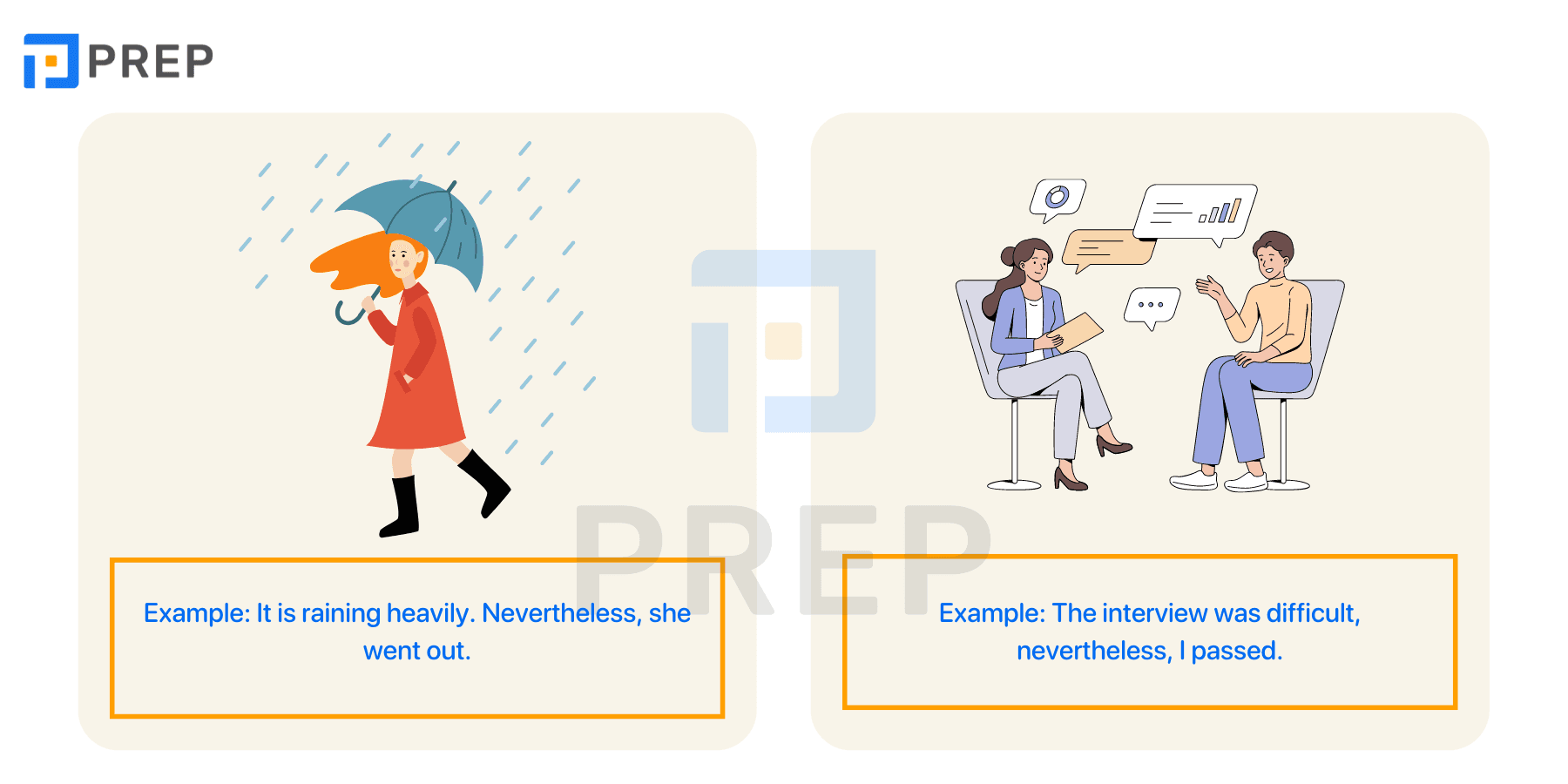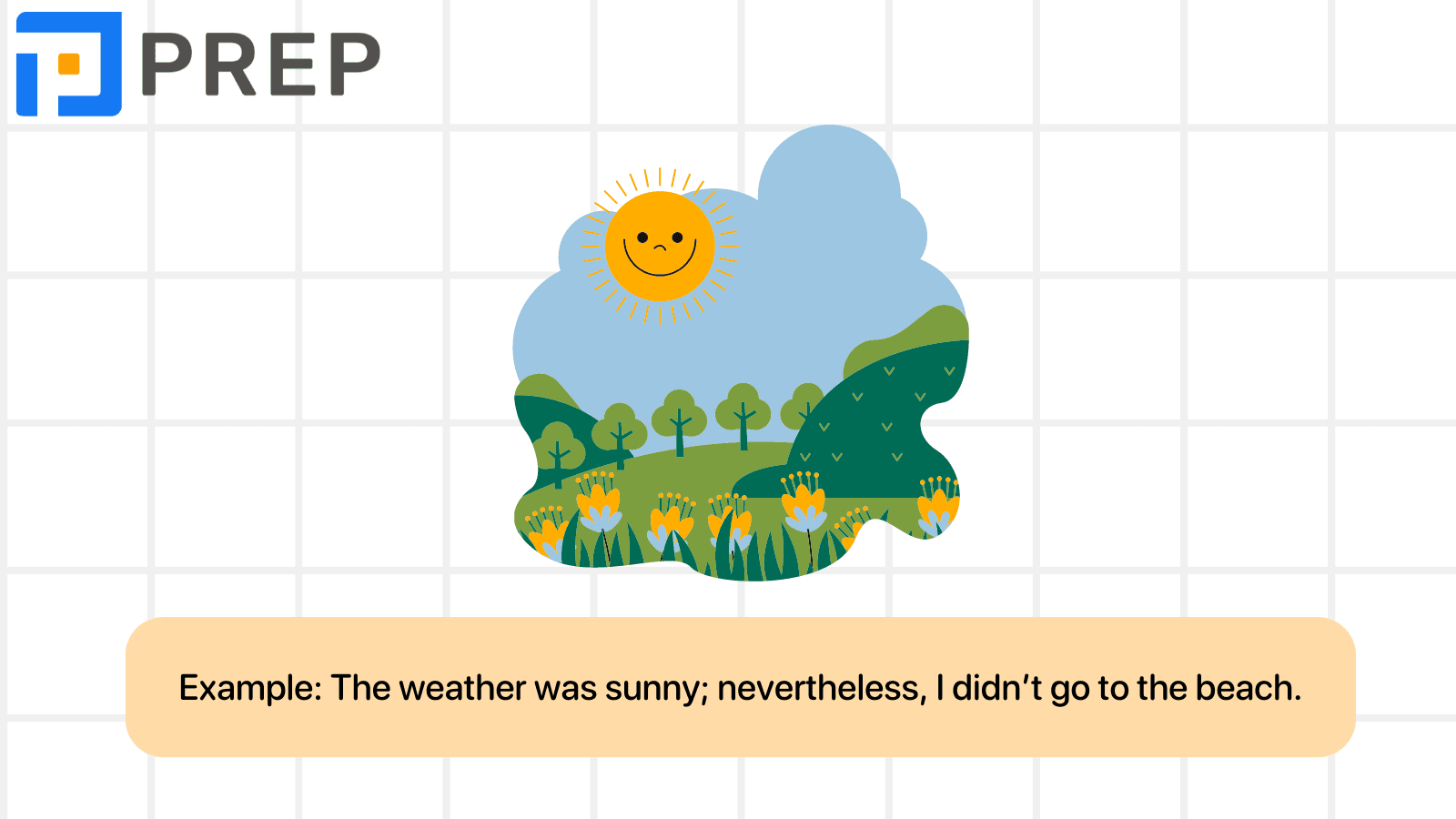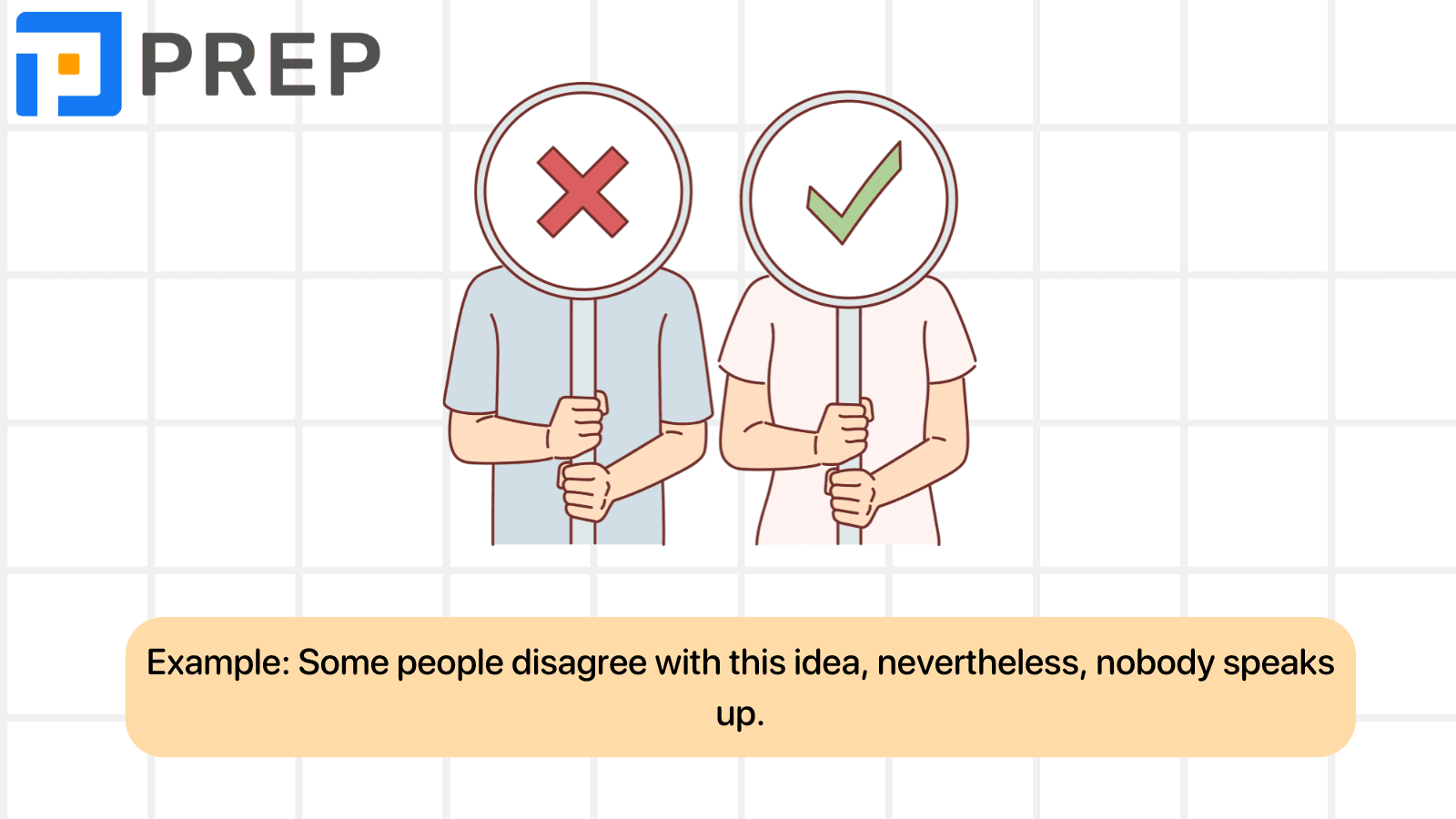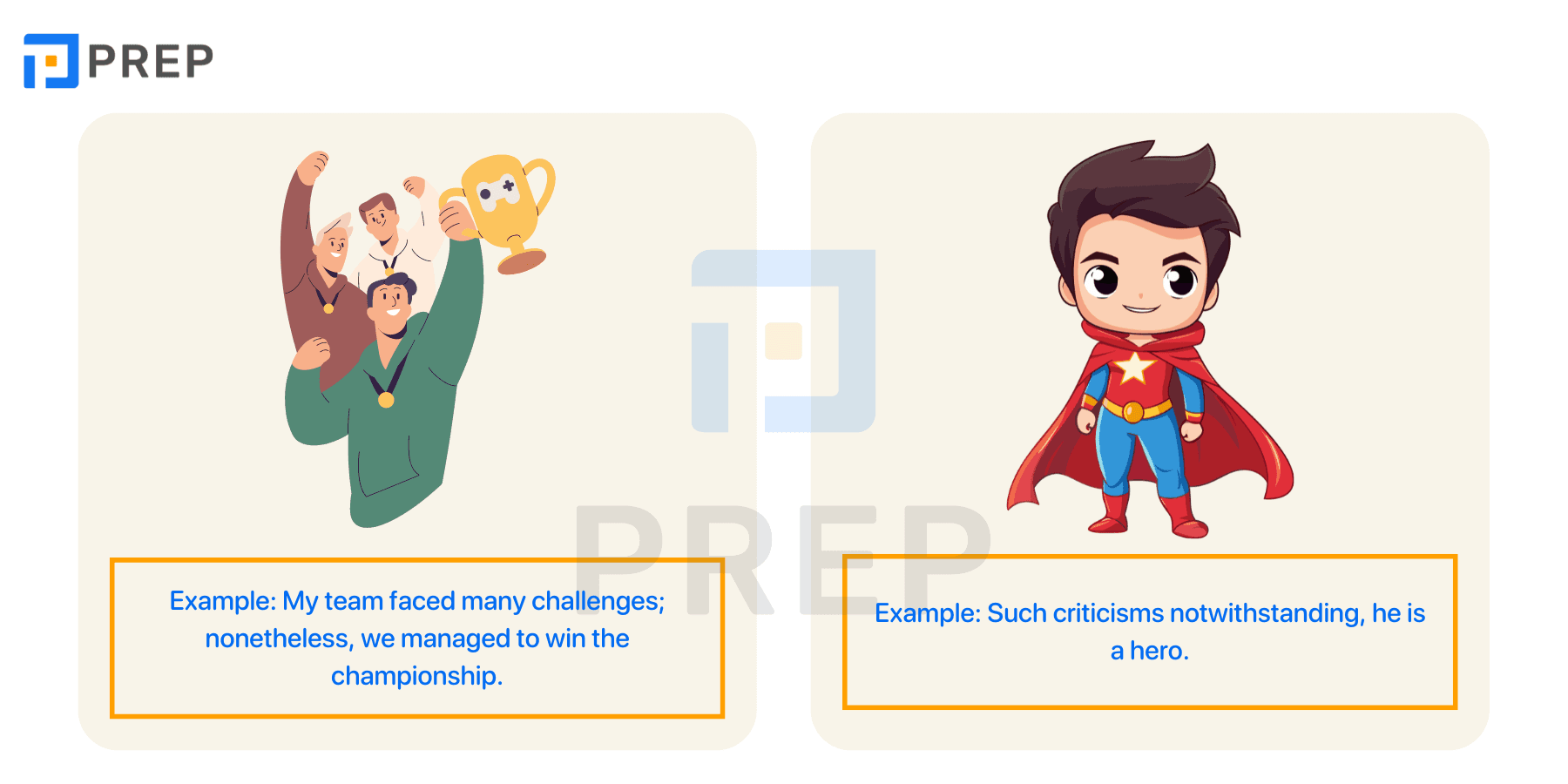Search blog
What is “nevertheless”? The usage of “nevertheless” in English
However, but, nevertheless are often used to indicate contrast between two clauses with opposing meanings. What does Nevertheless mean and in which cases is it used? PREP will explore the details of the Nevertheless in the below article!

- I. What is “nevertheless”?
- II. The positions of “nevertheless” in the sentence
- III. The usage of “nevertheless”
- IV. Equivalent structures/phrases to “nevertheless”
- V. Common words and phrases that are often used with Nevertheless
- VI. Some notes on “Nevertheless”
- VII. Exercises on “nevertheless”
- VIII. Take the First Step Towards IELTS Success
I. What is “nevertheless”?
What does “nevertheless” mean? Nevertheless means "nonetheless" or "regardless of that", and used as a conjunctive adverb. Below are some nevertheless examples:
- The competition was high. Nevertheless, I won.
- The test was very difficult; nevertheless, I earned a good grade

II. The positions of “nevertheless” in the sentence
Nevertheless can be placed at the beginning of the sentence, end of the sentence, or in the middle, depending on the specific context and usage. For example:
- It is raining heavily. Nevertheless, she went out. ➡ at the beginning of the sentence
- The interview was difficult, nevertheless, I passed. ➡ In the middle of the sentence
- My house is guarded around the clock, thieves still break in nevertheless. ➡ At the end of the sentence.

III. The usage of “nevertheless”
“Nevertheless” is often used to convey surprising information or to express something that contradicts what was previously mentioned. Below are some specific examples of using “nevertheless” in different contexts:
1. “Nevertheless” is at the beginning of the sentence
When placed at the beginning of a sentence, "nevertheless" acts as a conjunctive adverb linking two ideas that contrast with each other. It's important to note that proper punctuation rules should be followed when using this word.
The structure is as follows:
Clause 1. Nevertheless, clause 2.
Or
Clause 1; nevertheless, clause 2.
For example:
- He stopped working as a doctor in 2010. Nevertheless, he remained active in medical research.
- The weather was sunny; nevertheless, I didn’t go to the beach.

2. “Nevertheless” is at the middle of the sentence
In this case, Nevertheless serves as an introductory conjunctive adverb.
The structure is as follows:
Clause 1, nevertheless, clause 2.
For example:
- Some people disagree with this idea, nevertheless, nobody speaks up.
- They expressed their personal opinion, nevertheless, it was impolite.
Note: a comma should follow Nevertheless. In special cases, when Nevertheless is adding meaning to adjacent verbs, adjectives, or other adverbs, a comma is not necessary.
For example:
- Although already crazy due to the heavy traffic, I was nevertheless calm.
- The project failed. I have nevertheless decided to start again.

3. “Nevertheless” is at the end of the sentence
When placed at the end of a sentence, "nevertheless" conveys the meaning that regardless of what happens, the subject will still carry out the action, however, there is a period of stopping to consider before deciding whether to implement the action or not.
The structure is as follows:
Sentence 1. (,) Sentence 2, nevertheless.
S + V, but S + V + nevertheless.
Note: In this case, the comma is optional.
For example:
- My project failed. I would start the project again, nevertheless.
- I knew everything about the film, but I watched it again nevertheless.

IV. Equivalent structures/phrases to “nevertheless”
Below are some equivalent structures/phrases to “nevertheless” that you should know:

|
Word/ Phrase |
Meaning |
Example |
|
Nonetheless |
despite what has just been said or done |
My team faced many challenges; nonetheless, we managed to win the championship. |
|
However |
despite whatever amount or degree |
I like working out, however, I am lazy. |
|
But |
used to introduce an added statement, usually something that is different from what you have said before |
Long received, but I like handwritten letters. |
|
Notwithstanding |
despite the fact or thing mentioned |
Such criticisms notwithstanding, he is a hero. |
|
Though/ although |
despite the fact that |
Although it’s raining, I am going out. Though the restaurant was busy, the service was excellent. |
|
Even so |
despite what has just been said |
You don’t like her, but you should say hello to her even so. |
|
In spite of/ despite |
without taking any notice of or being influenced by; not prevented by |
In spite of the rain, I went out. |
V. Common words and phrases that are often used with Nevertheless
Common words and phrases that are most often used with Nevertheless are Still, but. For example:
- We broke up, he still cares about me nevertheless.
- It’s late for the meeting. She’s still having breakfast nevertheless.
- What you said was true but nevertheless useful.
VI. Some notes on “Nevertheless”
It is important to note the following to use “nevertheless”:
- It's important to pay attention to proper punctuation and placement.
- Distinguish the meanings and nuances of structures, phrases, and synonyms with Nevertheless to know how to use them correctly.
Below are some differences between Nevertheless and similar phrases/structures that you should know:
|
Word |
Usage |
Structure |
Example |
|
Nevertheless |
refer to an action, or situation that has, is, or may occur. |
See part III |
We broke up, he still cares about me nevertheless. |
|
Nonetheless |
point out an opinion or situation that contrasts with what was previously mentioned. |
Similar to nevertheless |
The company faced financial difficulties; nonetheless, they decided to proceed with their expansion plans |
|
However |
Tend to to express contrast or surprise. |
1. However, S + V + O 2. S + V, however, S + V 3. S + V + O, however |
1. My team thought we would win. However, we failed. 2. He was feeling sad, however, he went to work, and tried to concentrate. 3. I agree with your opinion. I think it is not the best idea, however. |
|
But |
connect two clauses that are completely opposite to each other. |
Clause 1 + but + Clause 2 |
She studied very hard for the test, but she didn’t get a good grade. |
|
Notwithstanding |
The word "notwithstanding" means "despite", "although", "regardless of", and is often used in formal writing or to convey opposing ideas with gravitas. |
Notwithstanding + Noun/Noun Phrase/Pronoun/Verb-ing |
We will proceed with the plan, notwithstanding the challenges we may face. |
|
Although/Though |
Often used in daily speaking |
1. Although + S + V, S + V 2. S + V + Although S + V |
1. Although it rained heavily, we went out for dinner. 2. I am still going to work although I am sick. |
|
Despite/In spite of |
Followed by a noun/a noun phrase. |
1. In spite of/ Despite +noun/ pronoun/ V-ing, the main clause. 2. The main clause + in spite of/ despite + noun/pronoun/ V-ing. |
1. In spite of the storm, I went out. 2. She went swimming in spite of all the danger signs. |
VII. Exercises on “nevertheless”
Please do the following exercises to master the usage of “nevertheless”:
1. Exercise 1: Correct or Incorrect
1. She really appreciates you nevertheless you still have to lose points for copying the exam.
- Correct
- Incorrect
2. “Nevertheless” can be placed at the end of the sentence.
- Correct
- Incorrect
3. “Nevertheless” can come after “but”.
- Correct
- Incorrect
2. Exercise 2: Choose the correct answers
1. My brother said his English is terrible. ____, he got a perfect score on his exam.
- A. Nevertheless
- B. Despite
- C. Although
2. I didn’t study for the test. ____, I passed it.
- A. Although
- B. Though
- C. Nevertheless
3. The air quality in the city is alarming. ____that, she likes living there.
- A. Yet
- B. Nonetheless
- C. Despite
4. There aren’t many beautiful places here, but I was having a memorable time ____.
- A. despite
- B. even so
- C. that yet
5. She is a vegetarian. ____, she sometimes eats meat.
- A. Although
- B. However
- C. Despite
3. Answer keys
- Exercise 1: 1 – Incorrect; 2 – Correct; 3 – Correct
- Exercise 2: 1 – A; 2 – C; 3 – C; 4 – B; 5 – B
VIII. Take the First Step Towards IELTS Success
Above is all the knowledge related to the “nevertheless” that you should remember. If you want to master IELTS test. Explore our advanced IELTS prep programs below:
👉 IELTS learning : Unlock Your IELTS Success Story.

Hi I'm Chloe, and I am currently serving as an Product Content Administrator at Prep Education. With over five years of experience in independent online IELTS study and exam preparation, I am confident in my ability to support learners in achieving their highest possible scores.
Comment
Related posts
Search blog
Personalized roadmap
Most read
Register for a learning roadmap consultation
Please leave your information, and Prep will contact you for consultation right away!















